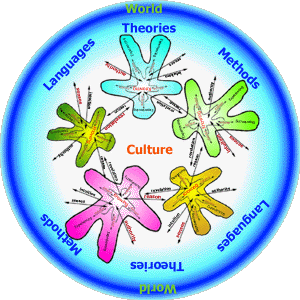Based on the assumption that both the philosopher and the scientist are relational persons, subject to the historical influence of others and their circumstances, we must be aware of the fact that theories are not cold objects. They are intimately connected to the biography of the philosopher or scientist. Moreover, they are connected to the destiny of their communities. Theories and their defendants are never neuter. So, there will never be a "point of equilibrium" in the process of knowing. Sometimes, emphasis will be put on reason (which can lead to rationalism), sometimes on revelation (which may lead to fanaticism), or authority (to totalitarianism of any kind), or senses (to epicureanism), etc. Even when researchers meet together, there can be the predominance of one or several emphases. Here, then--at such a meeting--one can estimate the extreme relevance of dialogue and its contradictory principle to prevent against the monopoly of one emphasis.
Reason, language, theories, methods, vision or blindness, all this has to do with the institutional realities where science takes place. The scientific instruments must be understood as socially constructed, remaining social to the end. The social and institutional factors must be added in the elaboration of theories and methods related to the process of knowing.
